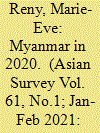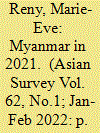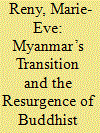| Srl | Item |
| 1 |
ID:
158662


|
|
|
|
|
| Summary/Abstract |
Protestant house churches have resorted to a form of subtle contestation which the author calls compliant defiance. Compliant defiance is the act of resisting central government policies while cooperating informally with actors in the local state in exchange for protection for the rules they challenge. Unregistered clerics engaging in compliant defiance choose not to formally register their congregations with the government, and operate independently from state corporatist religious associations in charge of managing the activities of official churches. They also bypass regulations on religious education, churches’ interactions with foreign Christian actors, church leaders’ travels, the distribution of religious material and proselytization. Informality has placed unregistered pastors in a position of vulnerability whereby they face risks of arbitrary state interference. Uncertainty has prompted them to seek protection from actors in local states by means of symbolic gestures of compliance and signals aimed at showing officials they are not a threat to political stability.
|
|
|
|
|
|
|
|
|
|
|
|
|
|
|
|
| 2 |
ID:
179252


|
|
|
|
|
| Summary/Abstract |
The NLD was reelected in 2020 with more seats than it won in 2015. Myanmar’s transition is not regressing, but many priorities remain before the state truly democratizes: conducting transparent trials of military officers who were involved in the killings of Rohingyas, solving the conflict between the Arakan Army and the Tatmadaw in Rakhine State, ensuring that enduring armed conflicts do not undermine citizens’ ability to vote, making sure the National Ceasefire Agreement prevents the resurgence of old animosities, demilitarizing the constitution, and restraining the military’s ability to sue opposition for defamation.
|
|
|
|
|
|
|
|
|
|
|
|
|
|
|
|
| 3 |
ID:
185208


|
|
|
|
|
| Summary/Abstract |
Parliament did not have a chance to convene under the newly elected National League for Democracy administration. Before the first parliamentary session was to take place in early February, the military detained the leaders of the incoming administration and took control of the executive. It justified its actions by saying elections in November 2020 were fraudulent and the Union Election Commission had refused to investigate possible irregularities in the vote. Although the military said new elections would be held within two years, its rule might not be temporary.
|
|
|
|
|
|
|
|
|
|
|
|
|
|
|
|
| 4 |
ID:
176135


|
|
|
|
|
| Summary/Abstract |
Myanmar began a transition in 2011 that ended almost 50 years of military rule. During the transition, a nationalist movement called for protecting Buddhism from an “Islamic threat.” Anti-Islam nationalism was not new in Burmese history, yet the timing of its resurgence deserves attention. I argue that the incumbents’ anticipated electoral weakness in transitional elections was the primary reason for its resurgence. The incumbents sought to maximize societal support, and they faced a strong contender, the National League for Democracy, whose probability of winning was high. Social opposition was also significant by the time military rule ended. In a campaign to pass reforms to better “protect” Buddhism, the incumbents used monks to cast doubt on the NLD’s ability to represent Buddhist interests and to recruit former regime opponents who were nationalists. The incumbents garnered wide support for the reforms, yet it was insufficient for an electoral victory.
|
|
|
|
|
|
|
|
|
|
|
|
|
|
|
|
| 5 |
ID:
102760


|
|
|